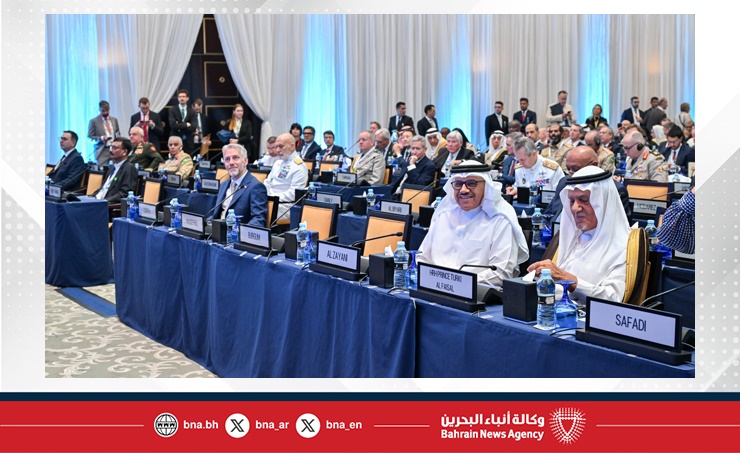Gulf states’ role in promoting regional and global security highlighted at IISS Manama Dialogue 2025

Manama, Nov. 1 (BNA): The second day of the 21st International Institute for Strategic Studies (IISS) Manama Dialogue 2025 continued in the Kingdom of Bahrain, bringing together senior leaders, ministers, experts, and policymakers to discuss regional and international security issues.
The discussions highlighted the pivotal role of the Gulf states in promoting regional and global peace and stability, and emphasised the importance of strengthening cooperation to address common security, economic, and humanitarian challenges. The sessions also underlined the significance of preventive diplomacy and sustainable development as foundations for lasting stability.
Organised by the IISS in cooperation with the Ministry of Foreign Affairs of the Kingdom of Bahrain, the second day began with the first plenary session, titled "The Future of Global Security Governance."
The session was chaired by Dr. Bastian Giegerich, Director-General and Chief Executive of the IISS, and featured Ayman Safadi, Deputy Prime Minister and Minister of Foreign Affairs and Expatriates of Jordan; Dr. Johann Wadephul, Federal Minister for Foreign Affairs of Germany; and the Rt Hon. Yvette Cooper, Secretary of State for Foreign, Commonwealth and Development Affairs of the United Kingdom.
Speakers discussed the evolving nature of global security and the need for a comprehensive approach that extends beyond military considerations to include effective governance, social resilience, and multilateral partnerships. They also examined the impact of artificial intelligence, energy transition, and the green economy on international stability, calling for stronger global coordination in crisis management and humanitarian response.
A special address followed under the title "National Security and Energy: The US Approach." Chaired by Sir John Chipman, Executive Chairman of the IISS, the address was delivered by Doug Burgum, Secretary of the Interior of the United States. It highlighted the close link between energy security and national security, stressing the need for a sustainable balance between development and stability. The session further underscored that stable energy markets form a cornerstone of global economic and political security, and that enhanced international cooperation in innovation, technology, and resource management is essential to sustainable growth.
The second plenary session, "Securing the Gulf: Diplomacy, Economics and Defence," was chaired by Sir John Chipman and brought together Dr. Abdullatif bin Rashid Al Zayani, Minister of Foreign Affairs of Bahrain; Sayyid Badr bin Hamad bin Hamood Al Busaidi, Minister of Foreign Affairs of Oman; Georgios Gerapetritis, Minister of Foreign Affairs of Greece; and Luigi Di Maio, Special Representative for the Gulf Region at the European Union.
The discussion highlighted the strategic contribution of the Gulf Cooperation Council (GCC) states to international peace and prosperity. Speakers also reviewed Bahrain’s role as a non-permanent member of the United Nations Security Council and its efforts to promote multilateral diplomacy, clean energy, and the green transition. The plenary also explored progress towards Gulf economic integration, including the customs union and common market projects, and the expansion of trade and investment partnerships with international counterparts.
The third plenary session, "The Geopolitics of Energy: Technology, Trade and Power", chaired by Dr. Bastian Giegerich, featured Jan Lipavský, Minister of Foreign Affairs of the Czech Republic; Ruben Brekelmans, Minister of Defence of the Netherlands; James P. Danly, Deputy Secretary of Energy of the United States; and Osama Mobarez, Secretary-General of the East Mediterranean Gas Forum. The discussion focused on the global energy landscape, its geopolitical dimensions, and the importance of innovation and regional cooperation to ensure energy security and economic resilience.
The day concluded with the fourth plenary session, "US Policy in the Levant: A Conversation with Ambassador Tom Barrack", chaired by Dr. Bastian Giegerich, featured Thomas J. Barrack, US Ambassador to Türkiye and Special Envoy for Syria. The dialogue addressed political and economic developments in the Levant and highlighted the importance of dialogue, counterterrorism cooperation, and post-conflict reconstruction in fostering regional stability.
The second day of the IISS Manama Dialogue 2025 reiterated the Gulf states’ growing influence in advancing security, diplomacy, and sustainable development, while emphasising the value of cooperative and preventive approaches to building a more stable and interconnected world.





